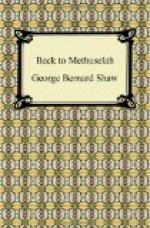THE POETRY AND PURITY OF MATERIALISM
Thus the stars in their courses fought for Darwin. Every faction drew a moral from him; every catholic hater of faction founded a hope on him; every blackguard felt justified by him; and every saint felt encouraged by him. The notion that any harm could come of so splendid an enlightenment seemed as silly as the notion that the atheists would steal all our spoons. The physicists went further than the Darwinians. Tyndall declared that he saw in Matter the promise and potency of all forms of life, and with his Irish graphic lucidity made a picture of a world of magnetic atoms, each atom with a positive and a negative pole, arranging itself by attraction and repulsion in orderly crystalline structure. Such a picture is dangerously fascinating to thinkers oppressed by the bloody disorders of the living world. Craving for purer subjects of thought, they find in the contemplation of crystals and magnets a happiness more dramatic and less childish than the happiness found by the mathematicians in abstract numbers, because they see in the crystals beauty and movement without the corrupting appetites of fleshly vitality. In such Materialism as that of Lucretius and Tyndall there is a nobility which produces poetry: John Davidson found his highest inspiration in it. Even its pessimism as it faces the cooling of the sun and the return of the ice-caps does not degrade the pessimist: for example, the Quincy Adamses, with their insistence on modern democratic degradation as an inevitable result of solar shrinkage, are not dehumanized as the vivisectionists are. Perhaps nobody is at heart fool enough to believe that life is at the mercy of temperature: Dante was not troubled by the objection that Brunetto could not have lived in the fire nor Ugolino in the ice.
But the physicists found their intellectual vision of the world incommunicable to those who were not born with it. It came to the public simply as Materialism; and Materialism lost its peculiar purity and dignity when it entered into the Darwinian reaction against Bible fetichism. Between the two of them religion was knocked to pieces; and where there had been a god, a cause, a faith that the universe was ordered however inexplicable by us its order might be, and therefore a sense of moral responsibility as part of that order, there was now an utter void.




